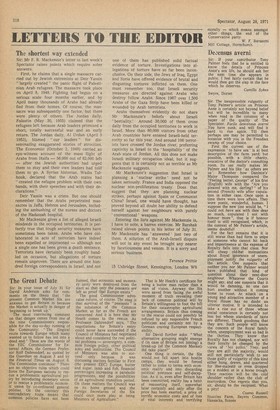The shortest way extended
Sir: Mr F. R. Mackenzie's letter in last week's Spectator raises points which require sober answers.
First, he claims that a single massacre carried out by Jewish extremists at Deir Yassin "largely created" the panic flight of Palestinian Arab refugees. The massacre took place on April 8, 1948. Fighting had begun on a serious scale four months earlier, and by April many thousands of Arabs had already fled from their homes. Of course, the massacre was subsequently one factor, but there were plenty of others. The Jordan daily, Falastin (May 30, 1955) claimed that the refugees left because Arab leaders promised a short, totally successful war and an early return. The Jordan daily, Al Urdun (April 9 1953), blamed "our leaders" for disseminating exaggerated stories of atrocities. The Economist (October 2, 1948) carried an eye-witness account of the mass flight of Arabs from Haifa — 56,000 out of 62,000 left — after the Jewish authorities had urged them to stay and their own leaders had told them to go. A Syrian historian, Wadia Talhouk, declared that the Arab states had "created the refugee problem with their own hands, with their speeches and with their declarations."
Deir Yassin was a crime. But one should remember that the Arabs perpetrated massacres in Jaffa, Hebron and Jerusalem, including the ambushing of the nurses and doctors of the Hadassah hospital.
Mr Mackenzie gives a list of alleged Israeli misdeeds in the occupied territories. It is perfectly true that tough security measures have sometimes been taken. Arabs who have collaborated in acts of terrorism have indeed been expelled or imprisoned — although not a single one has been given a death sentence. Terrorists have certainly been roughly handled on occasion, but allegations of torture remain unproven. There are around one hundred foreign correspondents in Israel, and not one of them has published solid factual evidence of torture. Investigations into allegations of torture have so far been inconclusive. On their side, the Jews of Iraq, Egypt and Syria have offered evidence of brutal and disgusting tortures inflicted on them. One must remember too, that Israeli security measures are directed against Arabs who destroy fellow Arabs. Since 1967 over 1,500 Arabs of the Gaza Strip have been killed or wounded by Arab terrorists.
Arabs themselves evidently do not share Mr Mackenzie's beliefs about Israeli 'bestiality.' Around 30,000 of them cross daily from the occupied territories to work in Israel. More than 80,000 visitors from other Arab countries have entered Israeli-held terrority so far this year. And around 100 terrorists have crossed the Jordan river, preferring captivity in Israel to the 'hospitality' of the Arab state of Jordan. All this does not make Israeli military occupation ideal, but it suggests that it is certainly not as terrible as Mr Mackenzie suggests.
Mr Mackenzie's suggestion that Israel is planning a 'nuclear strike' need not be taken seriously. France and India opposed the nuclear non-proliferation treaty. Does that suggest that they are planning nuclear strikes, perhaps against Spain or Communist China? Israel, one would have thought, has proved beyond all doubt her ability to defend herself against her neighbours with purely ' conventional ' weapons.
Entering the lists against Mr Mackenzie is, I have to note, a barren exercise. Mr Barshak raised eleven points in his letter of July 31. Mr Mackenzie has ' answered ' just two of them. A solution of the Arab-Israeli dispute will not in any event be brought any nearer by facetiousness and venom. It is a sorry and serious business.
Terence Prittie
15 Uxbridge Street, Kensington, London W8


































 Previous page
Previous page